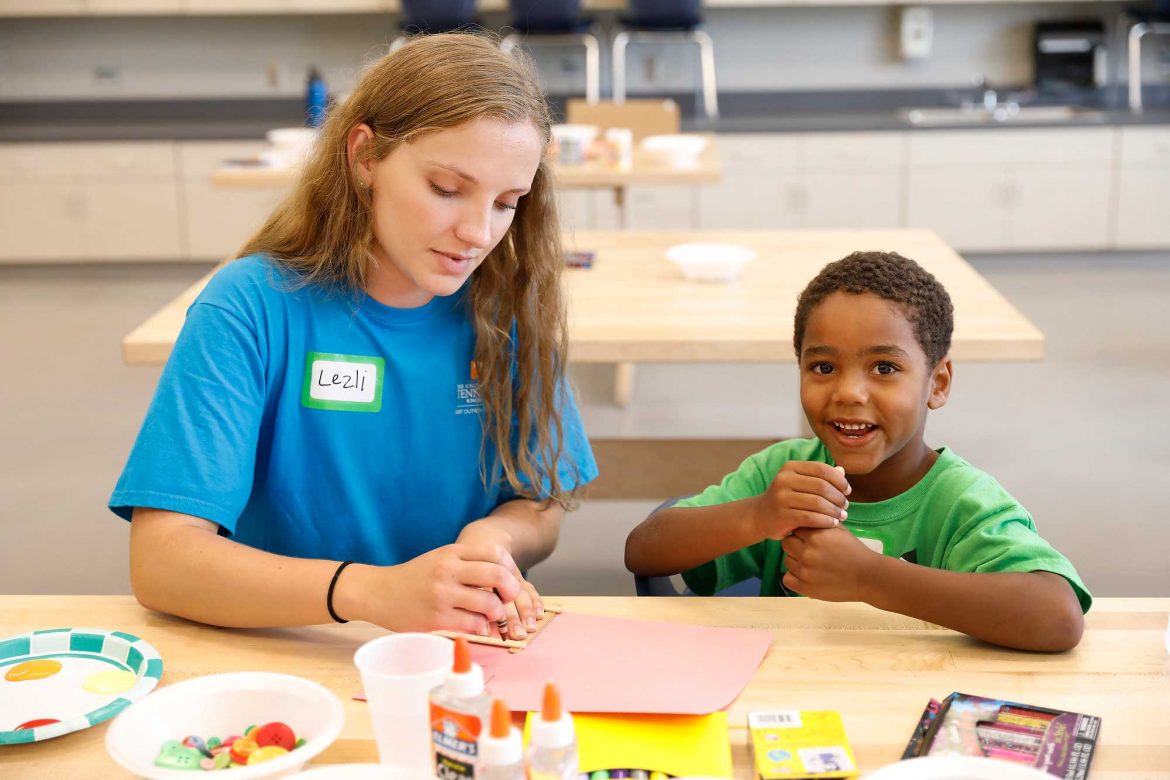About 10 years ago, just before Mother’s Day, Dean of the College of Education, Health, and Human Sciences, Bob Rider, was volunteering in a local elementary school, reading some books about mothers to a little girl named Aliya. He started to ask questions about her own mother, and that’s when Aliya frankly told him that her mom had passed away—but to keep reading.
Rider was amazed by Aliya’s strength, and it inspired him to launch the college’s Grief Outreach Initiative (GOI), which provides university students with complete training to work as mentors with children who have fewer resources to help them cope with grief from a loss or death.

Flash forward a decade and Aliya’s impact is still being felt through an inaugural camp, housed within GOI, named in her honor and held this summer for grieving children ages six through 10.
The camp, hosted at Pond Gap Elementary, fills a void during the summer months for local children who are grieving.
“Camp Aliya is something I have dreamt of doing for years,” says Laura Wheat, assistant professor and GOI coordinator. “And I felt confirmed in that dream when I noticed that there was nothing for grieving kids in the summertime around here.”
It turned out Jillian Blueford, doctoral candidate in the Counselor Education program, had a similar dream. The two got to work, laying out the structure for a camp and obtaining funding from the American Counseling Association Foundation to get it off the ground.
Wheat and Blueford feel especially passionate about helping grieving children because they both had suffered a loss while growing up and lacked support services to adequately cope. “It impacted how I viewed life and how I wanted to carry on the rest of my life,” says Blueford. “I did not get plugged into any grief camps or resources. I just received messages to deal with it on my own and have the willpower to overcome it.”
Not coping with loss or death of a loved one can have lifelong detrimental effects. Younger children tend to act out and have behavioral issues, while adolescents may become depressed and suicidal and may engage in risky activities.
“It’s important to help the younger end of the spectrum and teach them that it’s OK to love the person who is gone; and it’s OK to have angry feelings, and it’s OK to be getting a drink of water or eating lunch and all of a sudden feel really sad,” explains Wheat.
Grief camp teaches kids how to cope with these emotions in a healthy way. And the way they learn is actually fun. Contrary to what one might assume, there’s a lot of laughter and smiling at grief camp. There’s arts and crafts. There’s music. There’s outdoor play.

“Grief camps are set up to be full of fun and play while also allowing space to access memories and emotions related to grief,” says Wheat. “It’s a place where they learn that it’s OK to take a break from grief and just be a kid.” Wheat adds that although not a lot of breakthroughs are seen at the camp, it doesn’t mean the kids aren’t healing.
It’s a process, and what they learn over the two days will last a lifetime. “We’re just planting seeds,” says Wheat. “It grows as the child grows, and they’ll be able to think back to their experience at camp and have it comfort them.”
About a dozen volunteers, made up of mostly graduate students along with two undergraduate students, a school counselor, and one community member, helped operate the camp, which also offered a psychoeducational group for caregivers to share their experiences and learn how to help themselves and their children.
Throughout the two days, 14 children, many who have lost a parent, rotated through activities with their small groups. They stayed with the same peers throughout—a very important aspect of the program.
“This experience shows them that they’re not alone and other kids are going through similar things,” says Blueford. “I also hope it teaches them how to support others going through the same kind of thing.”
The camp closed with a memorial ceremony in which the campers were allowed the opportunity to acknowledge their lost loved one and receive support from the large group.
“This helps them learn that even though their loved one is gone from this earth, they can always carry them in their hearts and give and receive comfort,” says Wheat.
And while Wheat and Blueford have realized their dream of organizing a grief camp, they’re dreaming bigger dreams now. They have plans to use the camp to conduct research that could lead to the development of better coping strategies for children. They also plan to expand Camp Aliya to include more age groups.
Though it’s not known where Aliya is today, her strength lives on through the impact Wheat and Blueford are having on children now—and for years to come.

Photos by Erik Campos

